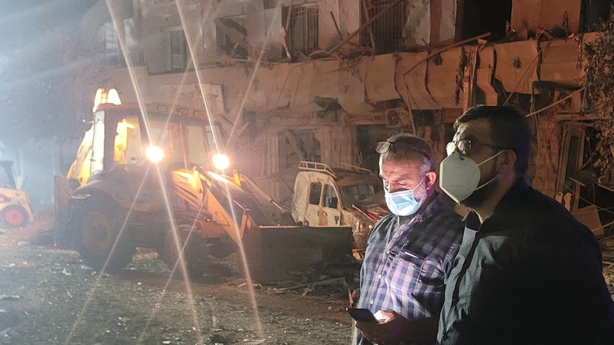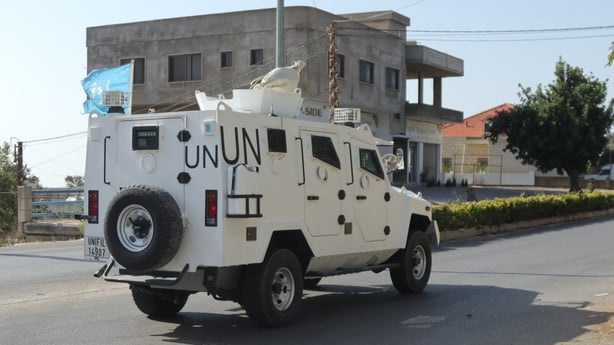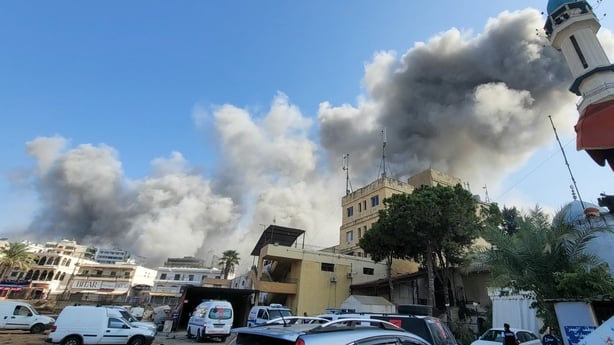An Israeli airstrike destroyed the municipal headquarters in a major town in south Lebanon, killing 16 people including the mayor, in the biggest attack on an official Lebanese state building since the Israeli air campaign began.
Lebanese officials denounced the attack, which also wounded more than 50 people in Nabatieh, a provincial capital, saying it was proof that Israel's campaign against the Hezbollah armed group was now shifting to target the Lebanese state.
The Israelis "intentionally targeted a meeting of the municipal council to discuss the city's service and relief situation" to aid people displaced by the Israeli campaign, Lebanese caretaker Prime Minister Najib Mikati said.
The UN mission in Lebanon (UNIFIL) said its peacekeepers observed an Israeli tank firing at their watchtower near southern Lebanon's Kfar Kela.
Two cameras were destroyed, and the tower was damaged, UNIFIL said.
Israel has previously called on the UN to move members of the UNIFIL peacekeeping force in southern Lebanon out of the combat zone for their safety.
UNIFIL says its troops have come under Israeli attack several times, though Israel has disputed accounts of those incidents.
Since Israel began its ground incursion, UNIFIL peacekeeping positions have come under fire and two Israeli tanks burst into one of its bases, the UN said.
Five peacekeepers have been injured, sparking alarm among European governments.
Israeli Defence Minister Yoav Gallant, on a visit to northern Israel near the border, said Israel would not halt its assault on Hezbollah to allow negotiations.
"Hezbollah is in great distress," he said according to a statement from his office. "We will hold negotiations only under fire. I said this on day one, I said it in Gaza and I am saying it here."
Israel launched its ground and air campaign in Lebanon to dismantle Hezbollah after a year during which Hezbollah fired across the border in support of the Hamas in Gaza.
In recent weeks Israel has assassinated Hezbollah's senior leadership and pushed into southern border towns, saying its aim is to make it safe for tens of thousands of Israelis to return to homes in Israel's north evacuated under Hezbollah fire.
Israel first issued an evacuation notice for Nabatieh, a city of tens of thousands of people, on 3 October.
At the time, the city's Mayor Ahmed Kahil said he would not leave.
Israel's military said it struck dozens of Hezbollah targets in the Nabatieh area and its navy also hit dozens of targets in southern Lebanon.
It said it had "dismantled" a tunnel network used by Hezbollah's elite Radwan Forces in the heart of a town near the border with Israel, publishing a video showing multiple explosions rocking a cluster of buildings.
Lebanese officials said it was the small town of Mhaibib.

Earlier, Israeli warplanes hit Beirut's southern suburbs for the first time in nearly a week.
Two blasts were heard, and plumes of smoke were seen rising from two separate neighbourhoods.
They came after Israel issued an evacuation order which mentioned only one building.
The Israeli military said it had targeted an underground Hezbollah weapons stockpile.
"Prior to the strike, numerous steps were taken to mitigate the risk of harming civilians, including advancing warnings to the population in the area," the Israeli military said.
It was the first attack on Beirut since 10 October, when two strikes near the city centre killed 22 people and brought down entire buildings in a densely populated neighbourhood.
Israeli operations in Lebanon have killed at least 2,350 people over the last year, according to the health ministry, and more than 1.2 million people have been displaced.
The U.N. says a quarter of the country is under evacuation orders.
Around 50 Israelis, both soldiers and civilians, have been killed in the same period, according to Israel.
Lebanon's caretaker Prime Minister Mikati appeared to cast doubt on diplomatic efforts to reach a ceasefire.
"What can deter the enemy (Israel) from its crimes, which have reached the point of targeting peacekeeping forces in the south? And what solution is hoped for in light of this reality?" he said in a written statement.

Having long accused UNIFIL of failing in its mission to keep armed fighters out of the border area, Israel adopted a more conciliatory tone.
"The State of Israel places great importance on the activities of UNIFIL and has no intention of harming the organization or its personnel," Foreign Minister Israel Katz said in a statement.
"Furthermore, Israel views UNIFIL as playing an important role in the 'day after' following the war against Hezbollah."
The 10,000-strong peacekeeper force comprises contingents from 50 countries, including 2,500 Italian, French and Spanish soldiers, causing strain between Israel and some of its most prominent European allies.
EU countries contributing to the peacekeeping mission held a conference call, and concluded that the mission is "essential and fundamental" and that only the UN can decide whether to end it, Spanish Defence Minister Margarita Robles said.

Cholera risk 'very high' - WHO
The risk of cholera spreading in Lebanon is "very high", the World Health Organization warned, after a case of the acute and potentially deadly diarrhoeal infection was detected there.
Lebanon's health ministry said a cholera case had been confirmed in a Lebanese national who went to hospital on Monday suffering from watery diarrhoea and dehydration.
The patient, from Ammouniyeh in northern Lebanon, had no history of travel, the ministry said.
The WHO highlighted the risk of cholera spreading among hundreds of thousands of people displaced since Israel escalated an air campaign against Hezbollah and launched a ground offensive intended to push the group back from its northern border with Lebanon.
"If the cholera outbreak .. spreads to the new displaced people, it might spread very fast," Abdinasir Abubakar, WHO's representative in Lebanon, told reporters in an online news conference.
